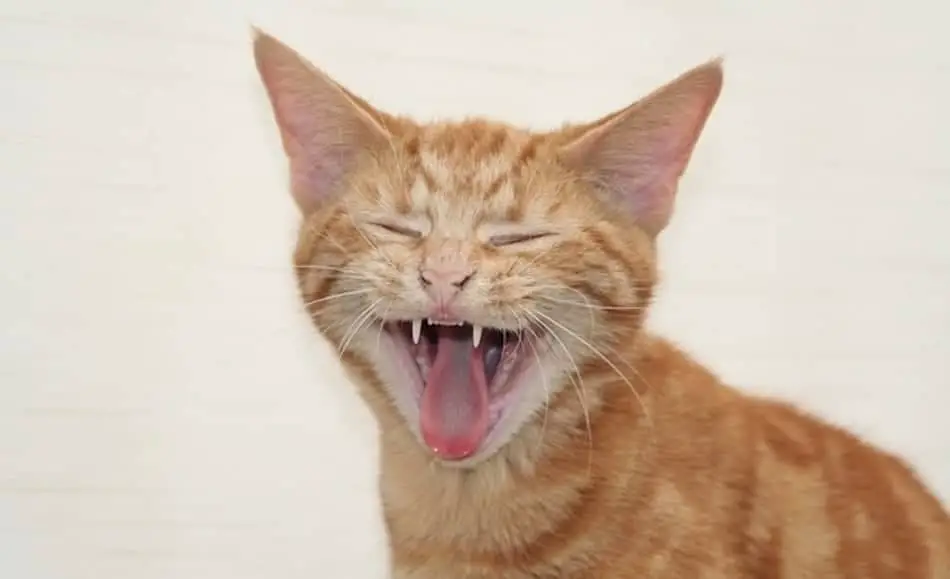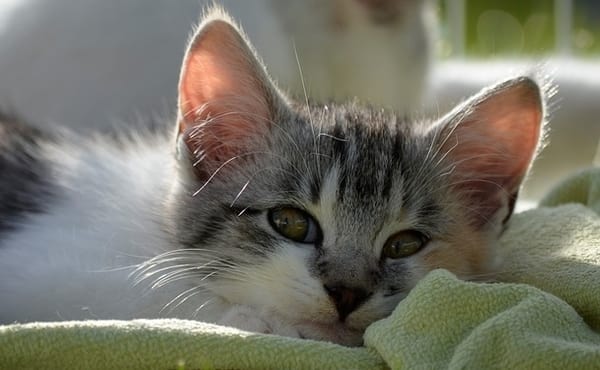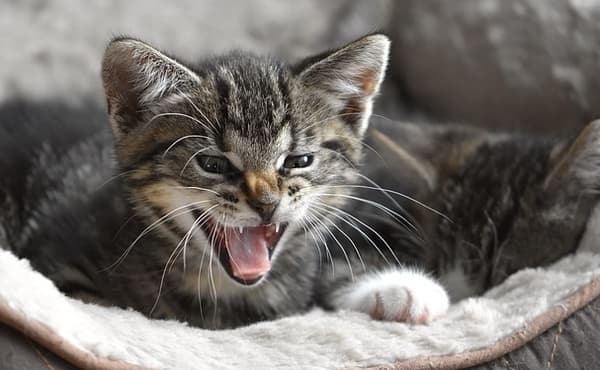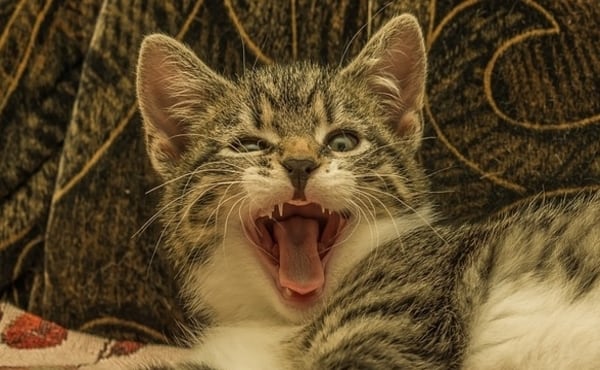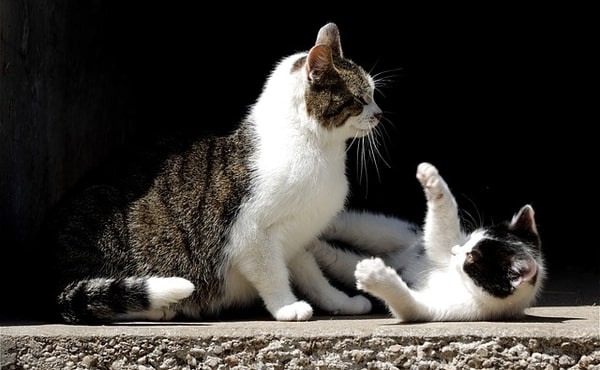Kittens are usually a source of joy, playfulness, and happiness in a new household, so it can come as something of a shock when you hear your kitten hissing, especially at your older cat. Chances are this behavior is temporary, so there is usually no great cause for concern.
So, why is my kitten hissing at my cat? The most likely reason is that your kitten is stressed from its recent move to your home and is not handling the unfamiliarity well. By extension, your kitten may also be feeling particularly defensive, or confused about the new hierarchy in your home.
This article will discuss how cats and kittens handle unfamiliarity and stress, how easy it is for them to feel defensive, their territorial nature and how it translates into our homes, and the possibility of play instincts not translating quite right.
Under Pressure
Like us and almost all other animals, cats and kittens feel stress, especially in new situations. Cats do not handle stress from unfamiliar situations very well, and like us, some cats simply handle it better than others. Further, cats are quite complex when it comes to social interactions.
Cats are largely thought to be solitary, however, many cats often form bonds of different natures in all kinds of situations. Feral cats often form colonies, or large groups of (usually related) cats who live together. Domestic cats frequently form lifelong bonds that transcend breed, age, or gender and have even been known to end in grief with the passing of one in a pair.
In all, it is difficult to determine how your existing cat or new kitten will handle the transition of bringing a new feline into your home. A new move for a kitten even without the presence of another cat is highly stressful in itself. Your kitten, until now, has only known its mother, littermates, and the environment into which it was born and raised.
In addition to a deep bond, kittens learn a great deal from their mothers in their first eight to twelve weeks of life. Some of these things include socialization, how the “pecking order” works, grooming, play, and more.
When your kitten is removed from that environment and placed in a new one with overwhelming scents, sights, sounds, and no mother or siblings, it can most certainly create stress for the little one.
In addition to being plucked from its home and put into a new one, there is a strange cat with a strange scent your kitten does not recognize, which will most certainly cause stress as well. As mentioned earlier, different cats handle stress differently.
If your kitten hisses at your resident cat, chances are they are stressed out at their new surroundings and their new housemate. Hissing in cats and kittens does not always translate to anger; rather, it is simply a vocalization of several extreme feelings. In this case: stress.
To help your kitten acclimate to your cat, first ensure each cat has its own space. Give them their own bowls, beds, toys, etc. Separate them for a couple days if need be to give them a little bit of a “do over.” If and when your resident cat is calm when interacting with your kitten, make sure to praise it often with affection and treats so the cat associates the kitten with positivity.
In the same vein, when your kitten manages a calm moment with your cat, reinforce with treats and affection. Feed them separately but within eyeshot of one another to get them used to eating “together.” Additionally, you can try playing with your cat and kitten at the same time to get them to bond through play.
Fortunately, this behavior most likely will be temporary. In rare cases, some cats simply never become friends, however, most cats can develop some kind of bond over time. Once your kitten understands the older cat is not a threat and that it is safe in your home, the stress that is driving its behavior likely will subside, resulting in a happy, playful kitten.
If stress is not driving your kitten’s behavior, it may be hissing at your cat out of a feeling of defensiveness.
Kitty Self-Defense
Contrary to their reputations, cats typically are more prone to the “flight” part of the “fight or flight” instinct. Even though cats are predatory by nature, when faced with conflict they usually prefer to flee, sometimes giving a few warning signs, including hissing, prior to their hasty departure.
Normally, they will only engage in a fight if they see no other option, so if your cats are fighting in the home, it is imperative to separate them and help them try to calm down.
Defensiveness in cats ties in closely with stress and territoriality, which we will discuss shortly, but it is its own issue nonetheless. If your kitten is hissing at your older cat every time they interact, your kitten may be feeling defensive in the presence of its elder.
Even if your kitten’s initial stress reaction to moving homes has started to wear off, this separate feeling may be lingering for several reasons. It could be that your kitten was not properly socialized in its early weeks or that your older cat is harassing it, whether you are aware of the harassment or not.
Often, hissing in cats is a warning sign they are giving you or other cats in the area that says, very definitively, what they are feeling. Sometimes it is anger or annoyance, but often it is stress or defensiveness.
Sometimes, the cat or kitten doing the hissing is not the aggressor at all, rather they are on the receiving end of the aggression and are trying to tell their counterpart that they are unhappy about it. Hissing is often a tactic cats use to avoid a fight, so it could be that your kitten is trying to make itself appear big and bad so your older cat will leave it alone.
To determine if your kitten is behaving defensively, look for these other body language cues it might be displaying in the presence of your older cat:
- Crouching
- Head tucked
- Tail wrapped around body and tucked
- Eyes wide with partially or fully dilated pupils
- Ears flattened sideways or all the way back
- Fur/hackles raised or puffy tail
- Turning sideways to face the other cat
If your kitten is exhibiting some of these cues there is no need to automatically assume your older cat is antagonizing it. There may be some feline miscommunication happening, and you can play referee to help your kitten feel secure. Give both cats plenty of time to calm down and ensure they have separate spaces to retreat to from one another.
As with reducing the stress of the unfamiliar, helping your cats bond by getting them to associate one another with positivity is important. With patience and perseverance, you and your feline friends will be getting along beautifully in no time.
If you do not believe stress or defensiveness is behind your kitten’s vocalizations, it could be that your kitten is confused about the pecking order in your home and is displaying territorial aggression.
This Here’s My Territory
Cats are quite territorial by nature, more so than dogs and some of our other domestic friends, so territorial disputes between new housemates are quite common.
Usually, however, it is the older resident cat who has a bone to pick with the newcomer regarding territory. So, when your kitten is the one displaying territorial aggression, addressing the issue can become a little more confusing.
If you do not think your kitten is acting out of stress or defensiveness, it may simply be confused about the pecking order of its new home. As we discussed earlier, kittens learn a great deal from their mothers in the first few weeks of their lives, including how a feline hierarchy works.
If, for some reason, your kitten missed that day in kitten refinement school, it may not understand that an older, stronger, resident cat is the head honcho in a place it moves into. If this is the case, your kitten could be using hissing, a classic territorial display, to try to tell its elder that it wants to be in charge.
Furthermore, some cats are predisposed to be more territorial than others, just like any other personality trait. Your kitten might simply feel driven, even if it was taught otherwise by its mother and littermates, to be the dominant presence in the household.
Fortunately, aside from the bonding methods mentioned above, you may not have to do much to correct this scenario. Your older cat likely will take on the role of educator for your kitten, whether the little one likes it or not, and will end up teaching the kitten how things really work.
This may come in the form of vocalizations, a light swat, or through play. As with our other potential scenarios, this likely will be temporary until your kitten learns and understands its place in the hierarchy of your home.
Barring stress, defensiveness, or territorial aggression, one last possible explanation for your kitten’s behavior is that it is simply trying, and perhaps failing, to play.
No Roughhousing?
Kittens love, above almost all else, to play. With so much natural energy bundled into their swiftly growing little bodies, they are compelled to play almost all the time! In cats, however, it is sometimes a little difficult to determine which behaviors mean play and which mean aggression, hunting, fear, etc.
Cats are believed to have 21 different kinds of vocalizations, some of which mean multiple things in different contexts, such as hissing. So, when your kitten hisses at your older cat, is it upset, or is it trying to play?
Looking at your kitten’s body language can help determine the answer to that question. Is your kitten’s tail lashing back and forth? Are its pupils dilated? Is the kitten pouncing and swatting rather than crouching and raising its hackles? If you answered yes to most or all these questions, your kitten is playing!
As discussed a few times already, however, if your kitten did not learn how to temper its playtime behaviors in its early weeks of life, it might be acting overly aggressive during play time. Again, your older cat likely will correct this for your kitten, so there is no immediate cause for concern. Be patient and vigilant with your feline friends and let the learning begin!
Conclusion
If your kitten is hissing at your older, resident cat, chances are it is stressed about its new environment and housemate. This is normal and likely temporary, so make sure you introduce them slowly and do your best to keep each cat calm and feeling safe and welcome.
Additionally, your kitten may be feeling defensive against your older cat, warranted or not, so take the same precautions to help them bond and feel safe, and understand that this feeling likely is temporary. Further, your kitten may be feeling a mistaken case of territory infringement, which your older cat likely will handle for you.
Finally, your little one might simply be trying to play but does not quite know how, which is another thing your older cat can handle. Be patient, calm, and observant of your feline friends, help them understand they are both safe and loved, and your kitten’s “hissy” fits likely will subside before you know it.

